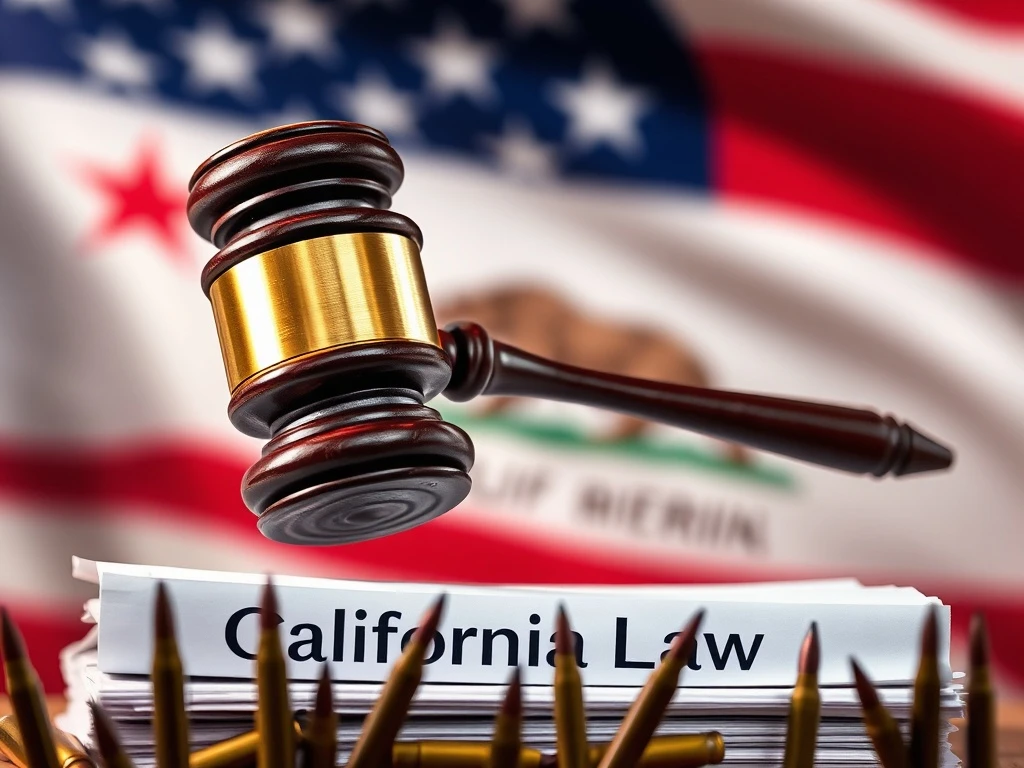Landmark: Federal Court Overturns California Ammunition Checks, Bolstering Second Amendment Rights

In the dynamic world of digital assets, regulatory shifts can feel like seismic events, reshaping the landscape overnight. While our focus often remains on blockchain and cryptocurrencies, understanding broader legal precedents can offer valuable insights into the future of governance and individual liberties. This principle is vividly illustrated by a recent federal court ruling that has sent ripples far beyond the crypto sphere, directly impacting fundamental rights and the ongoing debate over California ammunition checks.
Unpacking the Landmark Federal Court Ruling on Ammunition Checks
A significant decision from the 9th U.S. Circuit Court of Appeals has invalidated California’s 2016 voter-approved law, which mandated background checks for ammunition purchases. This ruling affirmed a lower court’s 2024 judgment, declaring the law unconstitutional under the Second Amendment. The court found that the legislation “meaningfully constrains” the right to bear arms by requiring gun owners to undergo repeated checks simply to acquire bullets.
The controversial law, effective since 2019, imposed a fee ranging from $1 to $19 per ammunition purchase. It faced widespread criticism for disproportionately affecting law-abiding gun owners who encountered difficulties accessing ammunition due to database limitations and bureaucratic hurdles.
The Enduring Impact of Second Amendment Rights
At the heart of this legal battle lies the fundamental question of Second Amendment rights. Gun rights advocates have long argued that restrictions on ammunition effectively restrict the right to bear arms itself, as firearms are useless without bullets. The California Rifle & Pistol Association (CRPA) has been a vocal opponent of the law, labeling it “absurdly restrictive.”
Chuck Michel, CRPA President, celebrated the ruling as a crucial victory against what he described as “overreaching government gun control.” This perspective underscores the deep divide between those who advocate for stricter gun regulations and those who prioritize the protection of constitutional gun ownership rights.
Bruen Decision’s Crucial Role in Shaping Gun Laws
The court’s decision hinged significantly on the Supreme Court’s pivotal 2022 Bruen decision. This landmark ruling established a new standard, requiring modern gun laws to align with historical firearm regulations. Judge Sandra Segal Ikuta, writing for the majority, emphasized that California failed to demonstrate the ammunition law’s consistency with historical precedents, a key requirement under Bruen.
This interpretative framework suggests that any contemporary ammunition restrictions lacking historical analogs could be vulnerable to legal challenges. The Bruen decision has fundamentally reshaped the legal landscape for gun control, shifting the burden onto states to prove that their regulations are rooted in historical tradition.
Analyzing the Challenges of California Gun Control Laws
Critics of the invalidated law pointed to numerous enforcement challenges and practical difficulties it created for legal gun owners. One of the most glaring issues was the state’s automated background check system, which rejected a staggering 11% of applicants in 2023. This high rejection rate complicated legal purchases for:
- Out-of-state residents
- Individuals with common names causing database confusion
- Owners of older firearms not easily verifiable
John Parkin, a local gun shop owner, articulated the frustration, stating the law seemed “written to make California gun owners angry,” offering no clear safety benefits while creating significant logistical hurdles. Conversely, Democratic Governor Gavin Newsom and the California Department of Justice condemned the court’s decision, asserting the law was a “common-sense, lifesaving” measure. They cited a 2024 state report indicating the law successfully blocked 200 ammunition sales to ineligible buyers.
Future Implications of the Federal Court Ruling
This federal court ruling aligns with broader post-Bruen legal trends that have seen an explosion of challenges to gun regulations across the nation. Since 2022, over 2,000 gun law cases have been filed, with numerous Republican-led states and gun rights groups actively challenging existing statutes.
While the law is now permanently unenforceable, California officials have expressed intent to explore further legal options. However, the ruling undeniably underscores the Supreme Court’s increasingly narrow interpretation of the Second Amendment, complicating future efforts to enact modern gun control laws. Analysts predict this outcome will heavily influence future litigation, particularly as states grapple with balancing historical context against contemporary public safety concerns.
This pivotal decision in California highlights the ongoing, complex legal battles over constitutional rights and government regulation. It serves as a powerful reminder that even seemingly settled laws can be challenged and overturned, reshaping the framework of individual liberties and state authority. The ramifications of this ruling will undoubtedly continue to unfold, influencing legislative debates and courtrooms across the United States.
Frequently Asked Questions (FAQs)
Q1: What was the core reason the federal court struck down California’s ammunition checks?
The federal court invalidated California’s ammunition background check law primarily because it found the law unconstitutional under the Second Amendment, arguing it “meaningfully constrains” the right to bear arms by imposing undue burdens on legal gun owners.
Q2: How did the Supreme Court’s Bruen decision influence this ruling?
The Supreme Court’s 2022 Bruen decision was central to this ruling. It requires gun laws to align with historical firearm regulations, and the court found that California failed to demonstrate its ammunition law’s consistency with such historical precedents.
Q3: What were some of the practical issues highlighted by critics of the law?
Critics pointed to an 11% rejection rate by the state’s automated background check system, logistical hurdles for legal gun owners, difficulties for out-of-state residents, and the perception that the law offered no clear safety benefits while creating bureaucratic nightmares.
Q4: What is the stance of California officials regarding this decision?
Democratic Governor Gavin Newsom and the California Department of Justice condemned the decision, calling the law a “common-sense, lifesaving” measure. They cited instances where the law blocked sales to ineligible buyers and expressed intent to explore further legal options.
Q5: How might this ruling affect gun control laws in other states?
This ruling reinforces the impact of the Bruen decision and suggests that similar modern gun control measures in other states lacking strong historical analogs could also be vulnerable to legal challenges, particularly those concerning ammunition sales or other perceived burdens on Second Amendment rights.









